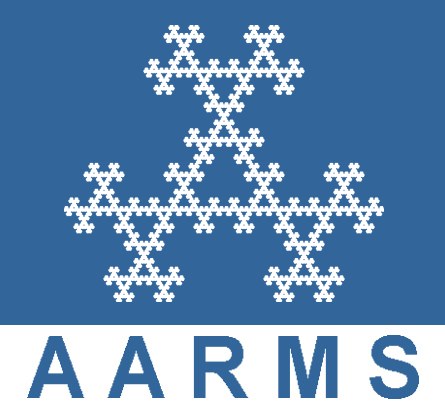Réunion d'ete SMC 2018
Fredericton, 1 - 4 juin 2018
Org: David Cruz-Uribe (University of Alabama), Galia Dafni (Concordia University) et Scott Rodney (Cape Breton University)
[PDF]
- R. ALVARADO, University of Pittsburgh
A measure characterization of the Sobolev embedding theorem and Lebesgue’s differentiation theorem. [PDF]
-
Historically, the Sobolev embedding theorem and Lebesgue's differentiation theorem have had a ubiquitous influence, playing a key role in establishing many basic results in the area of analysis. Typically, sufficient conditions on the underlying measure have been imposed in order to guarantee the availability of the aforementioned theorems.
In this talk, we will revisit these classical theorems and discuss some recent results which identify a set of conditions on the measure that are both necessary and sufficient to ensure their veracity. This is joint work with Przemyslaw Gorka (Warsaw University of Technology), Piotr Hajlasz (University of Pittsburgh), and Marius Mitrea (University of Missouri, Columbia).
- A. BUTAEV, Concordia University
Extension of functions of vanishing mean oscillation on domains [PDF]
-
In this talk, I will discuss joint work with Galia Dafni concerning the extension of $\rm{VMO}$ functions on Jones domains. I will review some properties of $\rm{VMO}$ functions following the papers of Jones and Brezis-Nirenberg. Finally, the construction of an extension operator $\Lambda: \rm{VMO}(\Omega) \to \rm{VMO}(\mathbb{R}^n)$ will be discussed.
- J. ISRALOWITZ, University at Albany
A vector valued Fefferman-Phong inequality [PDF]
-
Schrodinger operators $- \Delta + V$ with nonnegative potentials $V$ in the classical reverse Holder class $\text{B}_p$ were first studied by Z. Shen in 1995, who later in 1999 proved optimal decay bounds for the fundamental solution of these operators by using a variant of the classical Fefferman-Phong inequality. As a first step towards studying Schrodinger operators with a matrix $\text{B}_p$ potential (or more generally uniformly elliptic systems with a matrix $\text{B}_p$ potential), we prove that Shen's Fefferman-Phong inequality holds true in the vector-valued setting for these matrix potentials. This is joint work with B. Davey.
- D. KINZEBULATOV, Université Laval
$W^{1,p}$ regularity of solutions to Kolmogorov equation with Gilbarg-Serrin matrix [PDF]
-
In $\mathbb R^d$, $d \geq 3$, consider the divergence and the non-divergence form operators
\begin{equation}
\label{div0}
\tag{$i$}
-\Delta - \nabla \cdot (a-I) \cdot \nabla + b \cdot \nabla,
\end{equation}
\begin{equation}
\label{nondiv0}
\tag{$ii$}
- \Delta - (a-I) \cdot \nabla^2 + b \cdot \nabla,
\end{equation}
where the second order perturbations are given by the matrix $$a-I=c|x|^{-2}x \otimes x, \quad c>-1.$$ The vector field $b:\mathbb R^d \rightarrow \mathbb R^d$ is form-bounded with the form-bound $\delta>0$ (this includes a sub-critical class $[L^d + L^\infty]^d$, as well as vector fields having critical-order singularities).
We characterize quantitative dependence on $c$ and $\delta$ of the $L^q \rightarrow W^{1,qd/(d-2)}$ regularity of the resolvents of the operator realizations of \eqref{div0}, \eqref{nondiv0} in $L^q$, $q \geq 2 \vee ( d-2)$ as (minus) generators of positivity preserving $L^\infty$ contraction $C_0$ semigroups.
This is joint work with Yu.A.Semenov (Toronto).
- A. KOGOJ, University of Urbino
Harnack Inequality in sub-Riemannian settings [PDF]
-
We consider nonnegative solutions $u:\Omega\longrightarrow \mathbb{R}$ of second order hypoelliptic equations $$ \mathcal{L} u(x) =\sum_{i,j=1}^n \partial_{x_i} \left(a_{ij}(x)\partial_{x_j} u(x) \right) + \sum_{i=1}^n b_i(x) \partial_{x_i} u(x) =0,$$ where $\Omega$ is a bounded open subset of $\mathbb{R}^{n}$ and $x$ denotes the point of $\Omega$. For any fixed $x_0 \in \Omega$, we prove a Harnack inequality of this type $$\sup_K u \le C_K u(x_0)\qquad \forall \ u \ \mbox{ such that } \ \mathcal{L} u=0, u\geq 0,$$ where $K$ is any compact subset of the interior of the $\mathcal{L}$-propagation set of $x_0$ and the constant $C_K$ does not depend on $u$.
The result presented are obtained in collaboration with Sergio Polidoro.
- A. KUMAR, George Washington University
Scattering in the generalized Hartree equation [PDF]
-
We consider a nonlinear Schr\"odinger type equation with nonlocal nonlinearity, of a convolution type, called the generalized Hartree equation. In the focusing case we investigate global behavior of solutions. In the inter-critical regime we obtain a dichotomy for global vs finite time existing solutions exhibiting two methods of obtaining scattering: one via Kenig-Merle concentration - compactness and another one is using Dodson-Murphy approach via Morawetz on Tao's scattering criteria. We use Riesz transform estimates and other convolution type inequalities to treat the convolution type of nonlinearity.
- L. LANZANI, Syracuse University
Singular integral operators with holomorphic kernels: counterexamples to the Lebesgue Space -theory [PDF]
-
In this talk I will discuss joint work with E. M. Stein (Princeton U.) concerning the Lebesgue space theory for a family of singular integral operators in complex Euclidean space, whose integration kernels are holomorphic functions of the output variable. The main focus will be on counter-examples that show the optimality of the assumptions we make on the ambient domain (various kinds of convexity; boundary regularity). Specifically, I will first recall recently obtained counter-examples for the Cauchy-Leray integral for a family of pseudo-balls. I will then summarize work in progress that concerns the analysis of Lebesgue space-regularity for the Szego projection for the Diederich-Fornaess worm domain.
- S. LI, Rice University/McGill University
Geometric Compensated Compactness Theorems and Applications to the Isometric Immersion Problem [PDF]
-
In this talk we present two generalised compensated compactness theorems in the setting of Banach spaces and vector bundles, proved via functional and microlocal analytic methods. We then discuss their applications to the rigidity of isometric immersions of Riemannian/semi-Riemannian manifolds with weak regularities, and some related PDE problems. This is joint work with Prof. Gui-Qiang G. Chen.
- J. MASHREGHI, Laval University
Fejer kernel versus Dirichlet kernel [PDF]
-
Taylor polynomials are not the most natural objects in polynomial approximation. However, in most cases Cesaro means help and the resulting sequence of Fejer polynomials are a good remedy. In the context of local Dirichlet Spaces, we show that the sequence of Taylor polynomials may (badly) diverge. However, and surprisingly enough, if we properly modify just the last coefficient in the Taylor polynomial, the new sequence becomes convergent. As a byproduct, this also leads to the convergence of Fejer polynomials and de la Vallee Poussin polynomials.
Joint work with T. Ransford.
- I. MITREA, Temple University
The art of integration by parts [PDF]
-
The Integration by Parts Formula, which is equivalent with
the Divergence Theorem, is one of the most basic tools in Analysis. Originating in the
works of Gauss, Ostrogradsky, and Stokes, the search for an optimal
version of this fundamental result continues through this day and these
efforts have been the driving force in shaping up entire
subbranches of mathematics, like Geometric Measure Theory.
In this talk I will review some of these developments (starting from elementary considerations to more sophisticated versions) and I will discuss recents result regarding a sharp divergence theorem with non-tangential traces. This is joint work with Dorina Mitrea and Marius Mitrea from University of Missouri, Columbia.
- D. MONTICELLI, Politecnico di Milano
Poincaré inequalities for Sobolev spaces with matrix valued weights and applications [PDF]
-
For bounded domains of $\mathbb{R}^n$, we prove that the $L^p$-norm of a regular function with compact support is controlled by weighted $L^p$-norms of its gradient, where the weight belongs to a class of symmetric non-negative definite matrix valued functions. The class of weights is defined by regularity assumptions and structural conditions on the degeneracy set $S$, where the determinant vanishes. In particular, $S$ is assumed to be a sufficiently regular compact submanifold of $\mathbb{R}^n$ (with or without boundary) and the matrix weight $A$ is assumed to have rank at least one when restricted to the normal bundle of the degeneracy set $S$. As an auxiliary result of independendent interest, we also prove a regularity result for the distance function from a compact submanifold with boundary in $\mathbb{R}^n$.
This generalization of the classical Poincaré inequality can be applied to develop a robust theory of first order $L^p$-based Sobolev spaces with matrix valued weight $A$. The Poincaré inequality and these Sobolev spaces can then be applied to produce various results on existence, uniqueness and qualitative properties of weak solutions to boundary value problems for classes of degenerate elliptic, degenerate parabolic and degenerate hyperbolic PDEs of second order written in divergence form.
These results are joint work with K.R. Payne (Università degli Studi di Milano) and F. Punzo (Politecnico di Milano).
- M. PRAMANIK, University of British Columbia, Vancouver
On directions and operators [PDF]
-
Many fundamental operators arising in analysis are governed by sets of directions that they are naturally associated with. What are some of these operators? Why are they important? How do direction sets affect their behaviour? This talk will survey a few representative results in this area, and report on some new developments.
- C. RIOS, University of Calgary
On the Parabolic Kato Problem with Weights and Applications [PDF]
-
We obtain quadratic estimates for parabolic weighted elliptic operators. As a consequence we get Kato square root estimates, and regularity results for boundary value problems.
- T. VAN PHAN, University of Tennessee
Regularity theory for parabolic equations with singular degenerate coefficients [PDF]
-
In this talk, we discuss some recent results on regularity and solvability in weighted Sobolev spaces for a class of parabolic equations in divergence form with coefficients singular or degenerate in one spatial variable. Under certain conditions, reverse Holder's inequalities are established. Lipschitz estimates for weak solutions are proved for a class of homogeneous equations whose coefficients depend only on one spatial variable, but they can be singular and degenerate. These estimates are then used to establish interior, boundary, and global estimates of the Calderon-Zygmund type for weak solutions assuming that the coefficients are partially VMO(vanishing mean oscillations) with respect to the considered weights. The solvability in weighted Sobolev spaces for this class of equations is also achieved. The obtained results are new even for elliptic equations, and they extend some recent results for uniformly elliptic and parabolic equations.
The talk is based on the joint work with H. Dong (Brown University).
- M. WILSON, University of Vermont
Discretization with irregular grids [PDF]
-
\def\modd#1{\vert#1\vert}
\def\nrm#1{\Vert#1\Vert}
\def\dq{\lq\lq}
\def\Rd{{{\bf R}^d}}
\def\bigmodd#1{\left\vert#1\right\vert}
\def\bignrm#1{\left\Vert#1\right\Vert}
\def\Eff{{\cal F}}
A set of functions $\{\psi_\gamma\}_{\gamma\in\Gamma}\subset L^2(\Rd)$ is called {\it almost-orthogonal\/} if there is a finite $R_1$ so that, for all finite subsets $\Eff\subset\Gamma$ and all linear combinations $\sum_{\gamma\in\Eff}\lambda_\gamma\psi_\gamma$, $$\bignrm{\sum_{\gamma\in\Eff}\lambda_\gamma\psi_\gamma}_{L^2(\Rd)}\leq R_1\left(\sum_{\gamma\in\Eff}\modd{\lambda_\gamma}^2\right)^{1/2}.$$ If $\{\phi_\gamma\}_{\gamma\in\Gamma}$ is another almost-orthogonal family, with constant $R_2$, then $$T(f)\equiv\sum_{\gamma\in\Gamma}\langle f,\psi_\gamma\rangle\,\phi_\gamma\eqno(1)$$ (where $\langle\cdot,\cdot\rangle$ is the inner product in $L^2(\Rd)$) converges unconditionally for all $f\in L^2(\Rd)$ to define a linear operator mapping $L^2(\Rd)\to L^2(\Rd)$, with bound $\leq R_1R_2$. We look at familiar (\dq wavelet-like'') almost-orthogonal families indexed over $\Gamma=$ the dyadic cubes. We show that they stay almost-orthogonal when they are replaced by their averages over rectangles defined by \dq irregular'' grids (an operation we call irregular discretization), even though the discretized functions can have many jump discontinuities in bad places. We show that if the grids are fine enough, then the resulting discretizations of (1) provide good approximations to the operator $T$.
- H. YUE, Georgia College and State University
The space $JN_p$: nontriviality and duality [PDF]
-
This is a joint work with Galia Dafni, Tuomas Hyt\"onen and Riikka Korte.
We study a function space $JN_p$ based on a condition introduced by John and Nirenberg as a variant of BMO. It is known that $L^p\subset JN_{p}\subsetneq L^{p,\infty}$, but otherwise the structure of $JN_p$ is largely a mystery. Our first main result is the construction of a function that belongs to $JN_p$ but not $L^p$, showing that the two spaces are not the same. Nevertheless, we prove that for monotone functions, the classes $JN_{p}$ and $L^p$ do coincide. Our second main result describes $JN_p$ as the dual of a new Hardy kind of space $HK_{p'}$.





